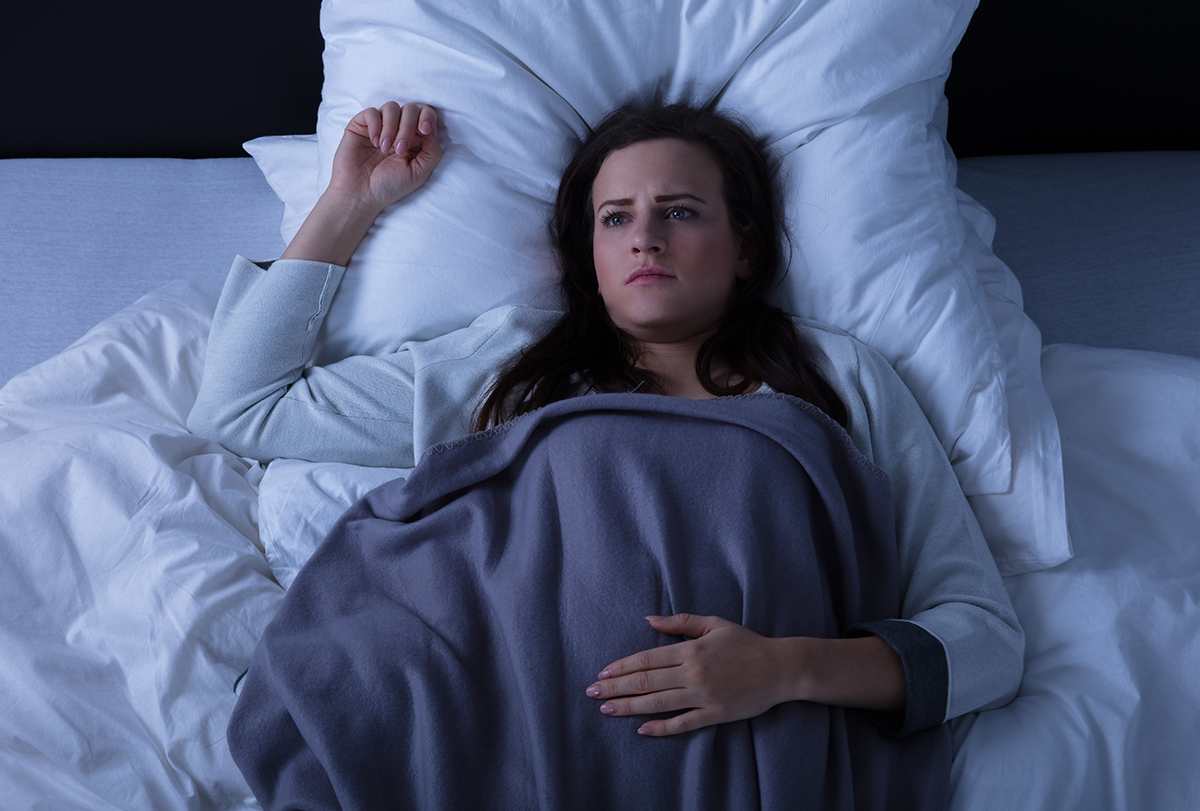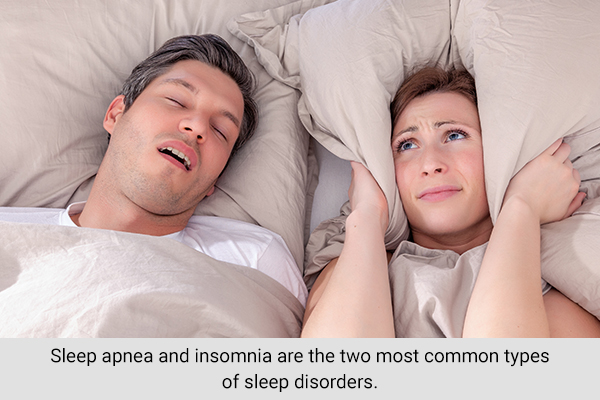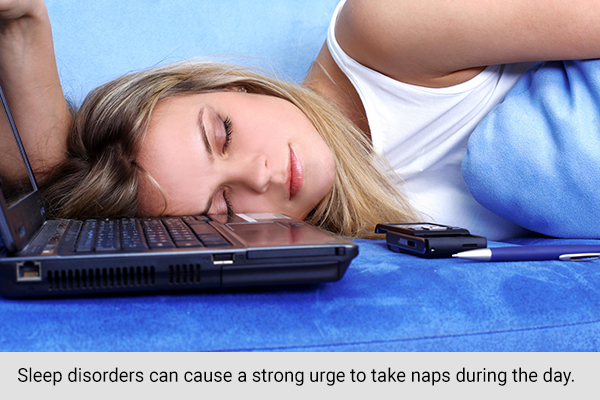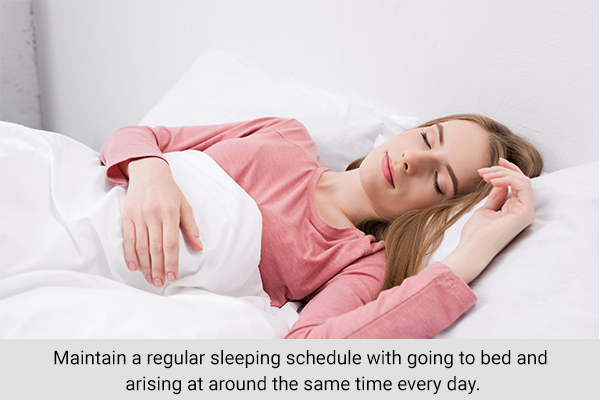In this article:
An adult person needs seven or more hours of sleep per night to achieve optimum physical health and mental well-being. (1)

The inability to sleep through the night on a regular basis, such that it renders you dysfunctional and drowsy during the day, is suggestive of a sleep disorder.
Furthermore, this sustained lack of sleep can be both physically and mentally taxing. Sleep disorders are often associated with erratic hormone levels, mood fluctuations, and weight gain as well as memory and concentration issues.
Prevalence of Sleep Disorders
Everyone experiences trouble sleeping at one time or another, but what’s alarming is that sleep disorders that are hard to shake off are becoming increasingly common.
According to the National Sleep Foundation, a whopping 45% of Americans indicated that a lack of sleep had affected their ability to complete daily activities at least once over the period of one week. (2)
In fact, the issue of sleep problems has become so prevalent that the National Sleep Foundation has created a Sleep Health Index. (3) The Sleep Health Index is designed to track sleeping habits of the American adult population on the basis of three criteria: sleep duration, sleep quality, and disordered sleep.
A 2017 study published in Sleep Health reported that the Sleep Health Index is a valid and reliable research tool and can give valuable information regarding the sleep health status of adults in the United States. (4)
Types of Sleep Disorders

Sleep apnea and insomnia are the two most common types of sleep disorders. A 2016 study published in the journal Sleep, reports that sleep apnea presented 47 percent of the sleep disorders and insomnia accounted for 26 percent of those diagnosed with a sleep disorder. (5)
1. Sleep apnea
Sleep apnea can be of three types:
- Obstructive sleep apnea – caused by the partial or complete obstruction of the airways due to the relaxation of throat muscles during sleep, causing the tongue and/or the fatty tissues to block the air passage.
- Central sleep apnea – caused by a dysfunction in the central nervous system, due to which the brain fails to send proper signals to the muscles that regulate breathing.
- Complex sleep apnea syndrome – is a combination of the above two forms of sleep apnea.
2. Insomnia
Insomnia can stem from a variety of factors:
- Altered sleeping routine or environment
- Personal or work-related stress
- Certain medications, such as blood pressure drugs, thyroid hormones, antidepressants, corticosteroids, ADHD stimulants, and even oral contraceptives
- An underlying pain-inducing health problem, such as arthritis, back pain, and headache
- Other sleep disorders, such as sleep apnea or restless legs syndrome (RLS)
- Mental health issues, such as depression, schizophrenia, and bipolar disorder
- Menopause, obesity, and cardiovascular ailments
- Unhealthy habits, such as alcohol consumption and smoking as well as recreational drug use
- Exposure to LED screens, either on a phone, TV, or laptop
3. Other common sleep disorders
There are multiple other common sleep disorders, such as:
- Restless legs syndrome (RLS): Primary RLS, which is idiopathic (unknown cause), and secondary RLS, which can be traced back to some underlying conditions, such as autoimmune diseases, high blood pressure, obesity, renal failure, thyroid disorders, diabetes, and heart disease as well as alcohol and tobacco use and certain medications.
- Narcolepsy: A neurological disorder caused by a disruption in the neurologic mechanism that is responsible for sleeping and waking.
- Parasomnias: Undesired experiences encountered while trying to fall asleep, such as nightmares and night terrors, sleepwalking and sleep talking, bed wetting, and teeth-grinding (also known as nocturnal bruxism). (6)
- Circadian rhythm sleep disorders: Usually caused by disruptions in the biological clock that governs your sleep-wake cycle, jet lag, odd working hours, and sleeping and waking up later than usual; often associated with depression and bipolar disorder as well as seasonal affective disorder.
Symptoms Indicative of Sleep Disorders

The signs and symptoms of sleep disorders can differ in severity and specific complaints, with some disorders associated with too little sleep and others associated with falling asleep at inappropriate times.
However, the general symptoms of sleep disorders include:
- Difficulty falling or staying asleep
- Daytime fatigue
- Strong urge to take naps during the day
- Excessive snoring
- Changes in breathing with sleep
- Irritability or anxiety
- Lack of concentration
- Depression
Adverse Effects of Sleep Deprivation
A study published in the British Journal of General Practice reported that sleep disturbances, especially early morning awakening and an inability to go off to sleep, are associated with anxiety and depression. Even inadequate sleep leads to a lack of concentration, daytime sleepiness, and impaired performance. (7)
Another study published in Nature and Science of Sleep in 2017 highlights the short-term and long-term consequences of sleep disturbances. According to this study, short-term consequences include increased stress, somatic pain, reduced quality of life, emotional distress, and mood disorders, as well as cognitive, memory, and performance deficits.
On the other hand, long-term consequences include hypertension, dyslipidemia, cardiovascular disease, weight-related issues, metabolic syndrome, type 2 diabetes mellitus, and colorectal cancer. (8)
Prevention of Sleep Disorders

- Maintain a regular sleeping schedule with going to bed and arising at around the same time every day.
- Take the necessary steps to manage and decrease your stress and anxiety levels.
- Avoid drinking too much water in the evening.
- Decrease or limit caffeine intake.
- Preferably quit smoking at the soonest, and especially avoid tobacco use (of any source) before going to bed, as nicotine is a stimulant.
- Do not eat heavy and/or spicy food for dinner, as they can give rise to digestive unrest that keeps you up at night. Opt for a light dinner instead, and wrap it up at least 3 hours before bedtime.
- Refrain from having too much sugar or caffeinated beverages too close to bedtime.
- Light exercise between dinner and bedtime, like a stroll in the park, can aid digestion, relieve stress, and promote better sleep. But too much exertion too close to bedtime can possibly end up sending your body into overdrive and keep you up. So, be mindful.
- Try not to engage in volatile or stressful discussions and other stimulating activities like social media surfing when you are about to go to sleep.
When to See a Doctor
If you’re experiencing persistent difficulty in sleeping, see a doctor to find out the exact problem. There are treatments available for most sleep disorders.
Final Word
Sleep disorders are a group of conditions that affect the ability to sleep well on a regular basis and hamper the quality of both your professional and personal lives.
Collectively, this group of a condition is second only to pain-related complaints as a cause for seeking medical help. If left unchecked, continuous sleep deprivation can greatly damage your physical, mental, and emotional wellbeing.

- Was this article helpful?
- YES, THANKS!NOT REALLY



